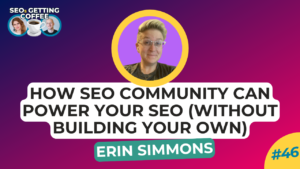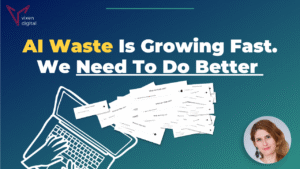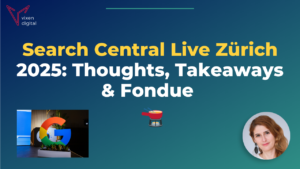In this episode of SEO’s Getting Coffee, Emina and Sean sit down with Alessandro Calzolari, marketing consultant and author of Empathic Marketing. Alessandro brings a fresh perspective to an age-old marketing challenge: how do you position your product or service in a way that resonates deeply with your audience?
Together, they explore the “vitamin vs painkiller” framework, a clever and practical lens for evaluating how your audience sees you. Are you something nice to have? Or something essential? More importantly, what does that mean for your SEO?
Watch Video
Vitamin or a Painkiller? Positioning, Psychology & SEO | SEOs Getting Coffee Ep.42
The Vitamin vs Painkiller Framework
Alessandro breaks down a simple but powerful analogy:
- Painkillers are perceived as essential. You solve an urgent problem or remove pain – users need you now.
- Vitamins are nice to have. You offer long-term benefits, but you’re not immediately necessary.
Here’s the catch: the same product or service can be seen as either, depending on how it’s positioned.
It’s All About Perception
You’re not what you say you are; you’re what your audience believes you are. Alessandro illustrated this with a gym supplement example: two people with the same goal (get fit) can see the same product differently. For one, it’s essential to progress. For the other, it’s just a bonus.
This applies directly to SEO. If your messaging and keywords align with an urgent need, you’re speaking to buyers in the “painkiller” mindset. If not, you may be unintentionally delaying their decision.
SEO’s Role in Positioning
As SEOs, it’s tempting to focus purely on visibility and volume. But Alessandro suggests SEO professionals should help clients understand how their products or services are perceived in the search journey:
- Are you solving a known, painful problem? That’s a painkiller, targeting high-intent, urgent keywords.
- Are you offering a longer-term benefit? That’s a vitamin; craft educational and informative content to build trust over time.
Your keyword strategy, content style, and CTAs should all reflect that understanding.
Practical SEO Applications
Here are a few examples Alessandro shared:
- Vitamin messaging:
“Improve your rankings over time with SEO best practices.”
(Long-term value, low urgency) - Painkiller messaging:
“Traffic dropped overnight? Here’s how to fix it fast.”
(High urgency, high conversion potential)
Knowing which one you’re aiming for can shape everything, from the keywords you target to how you structure your landing pages.
You Can Be Both - But Not All at Once
Emina brought up a brilliant insight: some companies try to frame everything as a painkiller, even when it’s clearly a vitamin. And it often falls flat.
The solution? Start with a clear intent. If you’re a painkiller today, be the one who gets them results. Later, when trust is built, you become the vitamin they come back for, offering value over time, without urgency.
As Alessandro put it: “Be the painkiller of today and the vitamin of tomorrow.”
Psychology, Ethics and Messaging
This episode didn’t shy away from exploring the psychology behind positioning or the deeper questions around ethics and perception in SEO. They debated whether marketers should frame products as essential when they’re really optional. Sean raised the question of manipulation, while Alessandro clarified that good marketing simply matches a product with an unmet need; it doesn’t create one from thin air.
Emina raised the important point that emotional levers, such as fear and urgency, can cross ethical lines if used carelessly. The consensus? You can use emotional messaging without being manipulative if you lead with empathy and honesty.
Search Behaviour, LLMs and Real-World Perception
Towards the end, they looked at how LLMs like ChatGPT reflect audience perception. Emina raised an interesting point: your brand’s perceived role in AI search might not align with your intended positioning.
If an LLM sees your brand as a “vitamin” when you want to be a “painkiller,” it might be time to rethink your messaging or test how users actually view you.
As Alessandro suggested, combine synthetic data (from LLMs) with raw feedback (from real users). Use both to adjust your positioning without losing sight of your core values.
Room 404: Spammy Comments
Alessandro’s Room 404 nomination? Spammy comments, especially the ones that are irrelevant, AI-generated or just plain awkward. “Looking forward to attending!” on a post about a US-based event when you’re in Brighton? That’s a no from us.
Engagement is great. But it should add something, especially if you’re aiming to build trust.
Final Thoughts
Positioning matters. Whether you’re selling services, software or supplements, how your audience sees you shapes everything, from your click-through rate to your long-term brand affinity.
You don’t have to choose between being a vitamin or a painkiller forever. But you do need to know which one you’re being at this time, and adjust your SEO strategy accordingly.
For more insights and in-depth conversations on the latest in SEO and digital marketing strategies, stay stuned for upcoming episodes of “SEOs Getting Coffee.” Subscribe to our channel for regular updates and expert opinions.
Connect with Alessandro Calzolari





